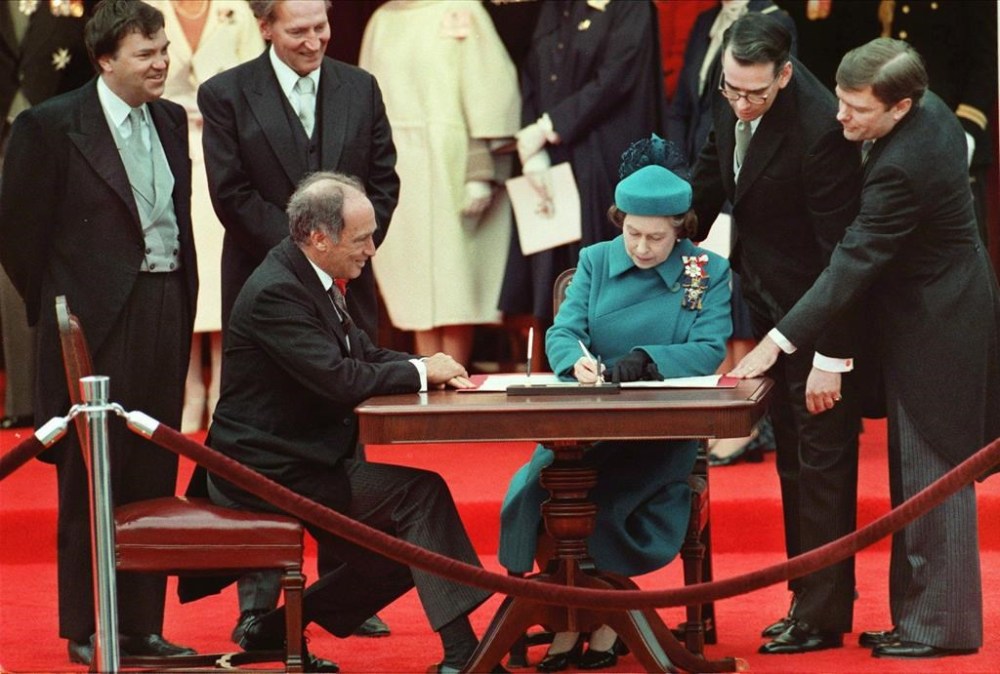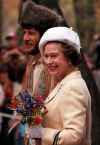The Queen visited Canada more than any other country during her long reign
Advertisement
Read this article for free:
or
Already have an account? Log in here »
To continue reading, please subscribe:
Monthly Digital Subscription
$0 for the first 4 weeks*
- Enjoy unlimited reading on winnipegfreepress.com
- Read the E-Edition, our digital replica newspaper
- Access News Break, our award-winning app
- Play interactive puzzles
*No charge for 4 weeks then price increases to the regular rate of $19.00 plus GST every four weeks. Offer available to new and qualified returning subscribers only. Cancel any time.
Monthly Digital Subscription
$4.75/week*
- Enjoy unlimited reading on winnipegfreepress.com
- Read the E-Edition, our digital replica newspaper
- Access News Break, our award-winning app
- Play interactive puzzles
*Billed as $19 plus GST every four weeks. Cancel any time.
To continue reading, please subscribe:
Add Free Press access to your Brandon Sun subscription for only an additional
$1 for the first 4 weeks*
*Your next subscription payment will increase by $1.00 and you will be charged $16.99 plus GST for four weeks. After four weeks, your payment will increase to $23.99 plus GST every four weeks.
Read unlimited articles for free today:
or
Already have an account? Log in here »
Hey there, time traveller!
This article was published 08/09/2022 (1187 days ago), so information in it may no longer be current.
HALIFAX – It wouldn’t be a stretch to suggest the Queen held a special place in her heart for Canada.
As an ardent world traveller, she visited this country more than any other during her reign, and she was in the habit of referring to it as home.
If you include overnight visits and aircraft refuelling stops, the Queen visited Canada no less than 31 times since her coronation in June 1952, according to the Canadian Heritage Department.

In second place is Australia with 18 visits, including stopovers, according to the The Royal Family’s official website.
“I think she really developed a warm affection for us,” says Barry MacKenzie, a spokesman for the Monarchist League of Canada. “She’s done a marvellous job of taking advantage of all of those opportunities to meet Canadians and to develop a taste for life here.”
Here are some highlighfts from her visits:
1. Fall 1951
Royal watchers say the Queen’s close relationship with Canada started even before she acceded to the throne.
On Oct. 8, 1951, Princess Elizabeth arrived at Montréal–Dorval International Airport, where she was met by 15,000 people on the tarmac.
Over the next 33 days, the princess and her husband, Prince Philip, travelled across the country and back again, visiting a total of 60 communities and every province.
She took in hockey games in Montreal and Toronto, made a side trip to Washington, D.C., to visit U.S. President Harry Truman, and square danced at Rideau Hall.
The quiet, 25-year-old princess and the gregarious prince were met by large crowds wherever they went, with some reports suggesting that one million people turned out to see them in Toronto and even more showed up in Montreal.
“It was an incredible feat of stamina,” says MacKenzie, a history instructor at St. Francis Xavier University in Antigonish, N.S.
“People recognized that this young woman was next in line …. And she also had the added bonus of having a husband who was a war hero. They were young. They were beautiful.”
At the end of the tour, in a farewell radio message broadcast from St. John’s, N.L., Princess Elizabeth referred to Canada as her “second home.”
“Wherever we have been throughout the 10 provinces … we have been welcomed with a warmth of heart that has made us feel how truly we belong to Canada.”
—
2. Fall 1957
The Queen’s first official visit to Canada was a high-profile, four-day tour that included her first ever televised speech, broadcast live from Rideau Hall on Oct. 13, 1957.
The next day, she officially opened a new session of Parliament by reading the speech from the throne in the Senate chamber, with Prince Philip at her side.
It was the first time a reigning monarch opened the Canadian Parliament. The speech was also carried live on television.
—
3. Summer 1959
The longest royal tour in Canadian history was a gruelling, 45-day marathon that started on June 18, 1959 in eastern Newfoundland.
The highlight of the visit was the official opening of the St. Lawrence Seaway on June 26, when the Queen was joined by U.S. President Dwight Eisenhower aboard the Royal Yacht Britannia at the lift-lock near St. Lambert, Ont.
Five days later, on Canada Day, the Queen delivered a televised address from a sunny veranda at Rideau Hall.
“If I have helped you feel proud of being Canadian, I shall feel well satisfied, because I believe with all conviction that this country can look to a glorious future,” she said.
The Queen and Philip travelled to every province and both territories, logging 24,000 kilometres.
“This is the first time since she became Queen that everyone in Canada had the opportunity to see her,” says MacKenzie. “And it’s the last time that we see one of these huge undertakings.”
The official itinerary included a trip to the Calgary Stampede, where Philip donned a cowboy hat, and numerous stops along the Great Lakes, including a trip to the World’s Fair in Chicago.
On the last leg of their tour, the young couple made an unscheduled stop in eastern New Brunswick to meet the families of fishermen who died on the night of June 20-21 when a hurricane roared over the Northumberland Strait. The brutal storm capsized more than two dozen fishing boats, killing 35 men and boys — most of them from the village of Escuminac.
At Pointe-du-Chêne, N.B., the Queen and the Duke of Edinburgh met with 16 grieving widows and their families on July 29.
Among them was a “tiny grey-haired woman in black, surrounded by 12 of her 18 surviving children,” The Canadian Press reported at the time.
“(She) sat on a Northumberland Strait wharf …. and blinked back the tears as she received a sympathetic smile and kind word from Queen Elizabeth.”
—
4. Summer 1967
The Queen and Prince Philip spent six days in Ottawa and Montreal to celebrate Canada’s centennial.
Under bright sunshine on Parliament Hill, 50,000 people watched as the Queen cut into a gigantic birthday cake decorated with the coat of arms of each province and territory.
And in Montreal, the Queen rode the automated monorail that was part of the Expo 67 international exhibition.
That brief visit was marked by tight security as organizers wanted to avoid what happened in 1964 when the Queen’s visit to Quebec City was marred by waves of police using truncheons to round up separatist protesters who were shouting slogans and singing irreverent songs.
—
5. Spring 1982
A four-day tour of Ottawa culminated in a ceremony on a sleet-soaked Parliament Hill, where the Queen joined Prime Minister Pierre Trudeau to sign the proclamation of the Constitution Act
The act gives the Canadian Parliament the right to amend the constitution without the approval of the British Parliament.
The Act’s passage, marked by royal assent from the Queen on April 17, 1982, signalled the last stage of Canada’s political evolution from colony to fully independent state.
But it did not signal the end of the monarchy in Canada. Far from it. The Queen remained Canada’s head of state and she retained her title as Queen of Canada.
“She wasn’t signing a document and giving us our freedom,” says MacKenzie. “This was the Queen of Canada signing an act that had been passed in her name in the Canadian Parliament …. It was not a declaration of independence.”
—
6. Summer 2010
On the Queen’s final visit to Canada, she told a crowd in Halifax exactly how she felt about this vast part of her realm.
“It is very good to be home,” she said on June 28 as she started a nine-day tour that would also take her to Ottawa, Winnipeg, Waterloo, Ont., and Toronto.
“My mother once said that this country felt like a home away from home for the Queen of Canada …. I am pleased to report that it still does.”
In Ottawa, she celebrated Canada Day with a crowd of 70,000 on Parliament Hill, where she took a more wistful tone in her speech.
“During my lifetime, I have been witness to this country for more than half its history since Confederation,” she said. “I have watched with enormous admiration how Canada has grown and matured while remaining true to its history, its distinctive character and its values.”
In her book, “A Royal Couple in Canada,” author Allison Lawlor says that on each of the Queen’s many visits to Canada, she “succeeded in gracefully lifting Canadians out of their everyday lives for a few moments.”
“Not only has she witnessed the growth of Canada, but generations of Canadians have watched the progression in her life as she moved from being their beautiful princess on her first visit in 1951, to a young mother raising four children, to a dignified Queen, and … as an elder, worldly stateswoman.”
This report by The Canadian Press was first published Sept. 8, 2022.




